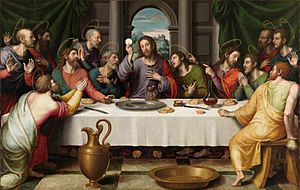Koinonia facts for kids
Koinonia is a special Greek word. It means things like fellowship, sharing, partnership, or being part of a community. In Christianity, it describes the strong feeling of unity and togetherness that Christians should have. This includes sharing gifts from the Holy Spirit, which helps and empowers people.
The word communion comes from Latin and means 'sharing in common'. It is closely related to Koinonia. When Christians talk about "Holy Communion," they usually mean a special religious ceremony called the Eucharist.
Contents
What Koinonia Means in the Bible
The main idea of Koinonia includes community, sharing, and closeness. It can also mean a gift that many people have given together. This word appears 19 times in the Greek New Testament. In one Bible version, the New American Standard Bible, it is often translated as "fellowship," "sharing," "participation," or "contribution."
Koinonia is used in the New Testament to describe sharing or fellowship with different things and people:
- Sharing in God's nature, with God, the Father, and His Son Jesus.
- Sharing in Jesus's sufferings and His future glory.
- Sharing with the Holy Spirit.
- Sharing in the special bread and wine of Christ (the Eucharist).
- Sharing with other Christians, their difficulties, and their faith.
- Sharing in the good news of the Gospel.
- Helping others with their needs, like giving money or support.
- Sharing in the human nature that everyone has.
- Working together in a partnership, whether for everyday tasks or religious work.
Some important meanings of Koinonia in the Bible are:
- Living life together in a community.
- The special connection between different groups, like Jews and non-Jews.
- Sharing in the Body and Blood of Christ during the Eucharist.
- Sharing in God's messages and being close to God Himself.
Different Ways of Sharing
Sharing in the Eucharist
The Eucharist is a Christian ceremony. It is seen as a way for Christians to share and connect with each other in the one body of Christ. Early Christians believed this was the full meaning of Koinonia during the Eucharist. A famous thinker named St. Thomas Aquinas said that the Eucharist is a special sign of the Church's unity. This unity comes from many people becoming one in Christ.
Sharing Between Churches
The term Koinonia can also describe a close relationship between different Christian churches. For example, the Anglican Communion is a group of churches that share a strong connection.
When churches have a complete relationship, sharing the same beliefs, sacraments, and leaders, it is called full communion. This means members of each church can fully take part in the other church's spiritual life. Sometimes, "full communion" is used more broadly. It can mean churches are not fully united but have agreements that allow members to have certain rights in each other's churches.
If a church believes another church shares some important Christian beliefs and practices, even if they don't have the same leaders, they might say there is "partial communion."
Sharing Between the Living and the Dead
The communion of saints is a belief among Christians. It describes the connection between all Christians, because they are made holy by their link with Christ. Some Christians believe this connection includes not only those still alive on Earth but also those who have passed away and are with God. This communion is seen as a strong bond between all saved people, both on Earth and in the next life. It is based on sharing God's grace, which comes through Christ.
The word "saints" can mean "holy people" or "holy things." So, "communion of saints" also means sharing in the holy things of faith. This includes sacraments (especially the Eucharist) and other spiritual gifts that Christians have in common.
The term "communion" is also used when people share in the Eucharist by eating the special bread and drinking the wine. This act is seen as entering a very close relationship with Christ.
Sharing Among Individual Christians
A Christian fellowship is a group of Christians who worship, pray, work together, volunteer, and spend time with each other. They do this because they share the same Christian faith. Members of these fellowships might belong to the same church or different churches. Many are linked to a local church or a group of churches. Others are independent groups formed by Christians who meet at universities, schools, workplaces, or in their neighborhoods. They gather to worship, socialize, and support each other based on their shared religious beliefs.
Koinonia in Popular Culture
Koinonia was the final word spelled in the 91st Scripps National Spelling Bee. A 14-year-old boy named Karthik Nemmani from McKinney, Texas, correctly spelled it to win the competition.
See also
 In Spanish: Koinonía para niños
In Spanish: Koinonía para niños
 | Sharif Bey |
 | Hale Woodruff |
 | Richmond Barthé |
 | Purvis Young |


